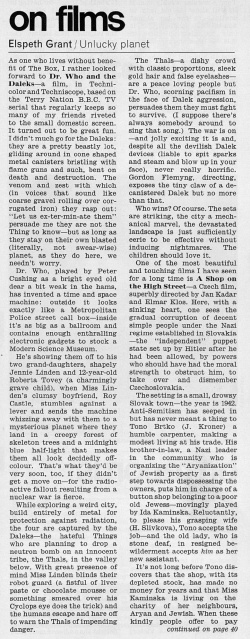Unlucky planet
- Publication: Tatler
- Date: 1965-07-07
- Author: Elspeth Grant
- Page: 39
- Language: English
As one who lives without benefit of The Box, I rather looked forward to Dr. Who and the Daleks—a film, in Technicolor and Techniscope, based on the Terry Nation B.B.C. TV serial that regularly keeps so many of my friends riveted to the small domestic screen. It turned out to be great fun. I didn't much go for the Daleks : they are a pretty beastly lot, gliding around in cone shaped metal canisters bristling with flame guns and such, bent on death and destruction. The venom and zest with which (in voices that sound like coarse gravel rolling over corrugated iron) they rasp out: "Let us ex-ter-min-ate them" persuade me they are not the Thing to know—but as long as they stay on their own blasted (literally, not swear-wise) planet, as they do here, we needn't worry.
Dr. Who, played by Peter Cushing as a bright eyed old dear a bit weak in the hams, has invented a time and space machine: outside it looks exactly like a Metropolitan Police street call box—inside it's as big as a ballroom and contains enough enthralling electronic gadgets to stock a Modern Science Museum.
He's showing them off to his two grand-daughters, shapely Jennie Linden and 12-year-old Roberta Tovey (a charmingly grave child), when Miss Linden's clumsy boyfriend, Roy Castle, stumbles against a lever and sends the machine whizzing away with them to a mysterious planet where they land in a creepy forest of skeleton trees and a midnight blue half-light that makes them all look decidedly off-colour. That's what they'd be very soon, too, if they didn't get a move on—for the radioactive fallout resulting from a nuclear war is fierce.
While exploring a weird city, build entirely of metal for protection against radiation, the four are captured by the Daleks—the hateful Things who are planning to drop a neutron bomb on an innocent tribe, the Thals, in the valley below. With great presence of mind Miss Linden blinds their robot guard (a fistful of liver paste or chocolate mousse or something smeared over his Cyclops eye does the trick) and the humans escape and hare off to warn the Thals of impending danger.
The Thals—a dishy crowd with classic proportions, sleek gold hair and false eyelashes—are a peace loving people but Dr. Who, scorning pacifism in the face of Dalek aggression, persuades them they must fight to survive. (I suppose there's always somebody around to sing that song.) The war is on —and jolly exciting it is and, despite all the devilish Dalek devices (liable to spit sparks and steam and blow up in your face), never really horrific. Gordon Flemyng, directing, exposes the tiny claw of a decanistered Dalek but no more than that.
Who wins? Of course. The sets are striking, the city a mechanical marvel, the devastated landscape is just sufficiently eerie to be effective without inducing nightmares. The children should love it.
Disclaimer: These citations are created on-the-fly using primitive parsing techniques. You should double-check all citations. Send feedback to whovian@cuttingsarchive.org
- APA 6th ed.: Grant, Elspeth (1965-07-07). Unlucky planet. Tatler p. 39.
- MLA 7th ed.: Grant, Elspeth. "Unlucky planet." Tatler [add city] 1965-07-07, 39. Print.
- Chicago 15th ed.: Grant, Elspeth. "Unlucky planet." Tatler, edition, sec., 1965-07-07
- Turabian: Grant, Elspeth. "Unlucky planet." Tatler, 1965-07-07, section, 39 edition.
- Wikipedia (this article): <ref>{{cite news| title=Unlucky planet | url=http://cuttingsarchive.org/index.php/Unlucky_planet | work=Tatler | pages=39 | date=1965-07-07 | via=Doctor Who Cuttings Archive | accessdate=22 December 2025 }}</ref>
- Wikipedia (this page): <ref>{{cite web | title=Unlucky planet | url=http://cuttingsarchive.org/index.php/Unlucky_planet | work=Doctor Who Cuttings Archive | accessdate=22 December 2025}}</ref>
